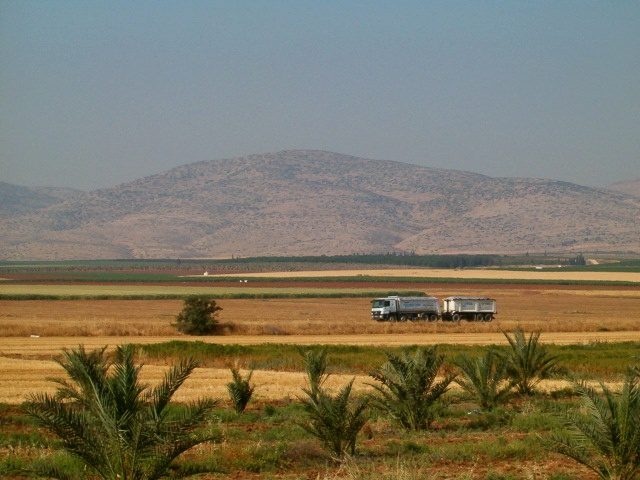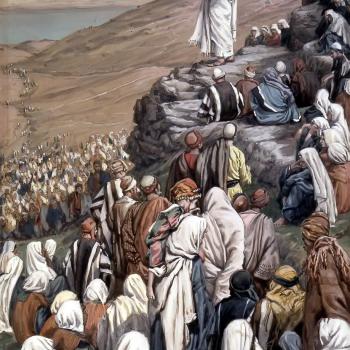
Compare Mark 1:21-22; Luke 4:32; 7:1; John 7:46
His audience’s perception that Jesus “taught them as one having authority, and not as the scribes,” has always struck me powerfully.
And it’s clear that he does precisely that.
When he performs a miracle, he doesn’t perform it “in the name of” someone else — that is, by borrowed authority. His authority is innate. It’s his. When he goes up onto the mount, it’s to proclaim his law — not, Moses-like, to receive it. And when he quotes what was said “by them of old time” and immediately overturns it, he doesn’t produce an argument or cite authorities to justify his reasoning. He simply states the truth. As if he needs nobody else’s authority to say and do such things. Which, in fact, is precisely true.
***

(Wikimedia Commons public domain image)
Compare Matthew 4:24-5:2; Mark 3:7-13
There is an obvious version of the Sermon on the Mount given in Luke. It’s often called “The Sermon on the Plain.”
Is Luke giving a variant account of the incident in Matthew?
Maybe.
I think it entirely plausible, though, and not at all difficult to imagine, that Jesus might have delivered so great a sermon on more than one occasion during his Palestinian ministry. After all, as Latter-day Saints know, he also delivered it to the Nephites following his resurrection.
I myself have only three ideas, one joke, and five and a half anecdotes, and I recycle them endlessly in various classes and speeches. But this is probably the greatest, richest, most quotable and discussed sermons in history. Unlike my shallow twaddle, it deserves to be repeated.
This reading sets the stage for the Sermon on the Plain.
***

Compare Matthew 5:3-13
The Beatitudes, as they’re given in Luke’s account of the Sermon on the Plain, vary somewhat from those given by Matthew in his account of the Sermon on the Mount.
For instance, they’re addressed to the Savior’s audience, in the second person plural, rather than spoken in the third person plural.
Luke 6:20 pronounces a blessing upon the “poor,” rather than specifying the “poor in spirit.” And it speaks of the “kingdom of God” rather than, as Matthew does, of the “kingdom of heaven” (or, more properly, the “kingdom of the heavens,” ἡ βασιλεία τῶν οὐρανῶν). And it’s opposed by Luke 6:24, which pronounces a “woe” to the rich.
“Those who mourn” and “the meek,” of Matthew 5:5-6, are missing. As are, while we’re at it, “the merciful,” “the pure in heart,” “the peacemakers,” and “those who are persecuted for righteousness’ sake” (i.e., Matthew 5:7-10).
Luke’s “blessed are you that hunger now” (6:21) varies from Matthew’s “hunger and thirst for righteousness” (Matthew 5:6). And it’s paired with Luke 6:25a (“Woe to you that are full now, for you shall hunger”).
The Lukan “Blessed are you that weep now, for you shall laugh” (6:21b) has no real counterpart in Matthew’s sermon, but, again, is contrasted with Luke 25b (“Woe to you that laugh now, for you shall mourn and weep”).
The same sort of contrast follows Luke 6:22-23, which is pretty much equivalent to Matthew 5:11-12 but which lacks the rejoinder given in Luke 6:26: “Woe to you, when all men speak well of you, for so their fathers did to the false prophets.”












